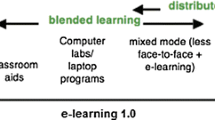Abstract
Knowledge Societies also named Social Learning Networks (SLN) allow interaction and collaboration between individuals (instructors and students), who share their connections under a scheme of learning communities around common learning interest. In this paper, we present Zamná, a Knowledge Society implemented as an adaptive learning social network. A community of Instructors and Learners can create, display, share and assess communities, intelligent tutoring systems or adaptive courses in a collaborative environment. The communities and courses are tailored to the student’s learning style according to the learning style model of Felder-Silverman. The identification of community’s and student’s learning style is performed using self-organizing maps. The main contribution of this paper lies at the integration of Artificial Intelligence with SLN.
Access this chapter
Tax calculation will be finalised at checkout
Purchases are for personal use only
Preview
Unable to display preview. Download preview PDF.
Similar content being viewed by others
References
Boyd, D.M., Ellison, N.B.: Social network sites: Definition, history, and scholarship. Journal of Computer-Mediated Communication 13(1), article 11 (2007)
Ivanova, M.: Knowledge Building and Competence Development in eLearning 2.0 Systems. In: I-KNOW 2008, Graz, Austria, September 3-5, pp. 84–91 (2008)
Carmona, C., Castillo, G., Millán, E.: Designing a Bayesian Network for Modeling Student’s Learning Styles. In: Díaz, P., Kinshuk Aedo, I., Mora, E. (eds.) ICALT 2008, pp. 346–350. IEEE Computer Society, Los Alamitos (2008)
Graf, S., Kinshuk Aedo, I., Liu, T.: Identifying Learning Styles in Learning Management Systems by Using Indications from Students’ behavior. In: Díaz, P., Kinshuk Aedo, I., Mora, E. (eds.) ICALT 2008, pp. 482–486. IEEE Computer Society, Los Alamitos (2008)
Limongelli, C., Sciarrone, F., Vaste, J.: LS-PLAN: An Effective Combination of Dynamic Courseware Generation and Learning Styles in Web-based Education. In: Nejdl, W., Kay, J., Pu, P., Herder, E. (eds.) AH 2008. LNCS, vol. 5149, pp. 133–142. Springer, Heidelberg (2008)
Felder, R.M., Silverman, L.K.: Learning and Teaching Styles in Engineering Education. Engineering Education 78, 674–681 (1988)
Kohonen, T.: Self-Organization and Associative memory, 3rd edn. Springer, Heidelberg (1989)
Felder, R.M., Solomon, B.A.: Index of Learning Styles Questionnaire, http://www.engr.ncsu.edu/learningstyles/ilsweb.html
Doignon, J.-P., Falmagne, J.C.: Knowledge Spaces. Springer, Heidelberg (1999)
Wolf, P., Hill, A., Evers, F.: Handbook for Curriculum Assessment. University of Guelp, Ontario (2006)
Author information
Authors and Affiliations
Editor information
Editors and Affiliations
Rights and permissions
Copyright information
© 2010 Springer-Verlag Berlin Heidelberg
About this paper
Cite this paper
Barrón-Estrada, M.L., Zatarain-Cabada, R., Zatarain-Cabada, R., Barbosa-León, H., Reyes-García, C.A. (2010). Building and Assessing Intelligent Tutoring Systems with an e-Learning 2.0 Authoring System. In: Kuri-Morales, A., Simari, G.R. (eds) Advances in Artificial Intelligence – IBERAMIA 2010. IBERAMIA 2010. Lecture Notes in Computer Science(), vol 6433. Springer, Berlin, Heidelberg. https://doi.org/10.1007/978-3-642-16952-6_1
Download citation
DOI: https://doi.org/10.1007/978-3-642-16952-6_1
Publisher Name: Springer, Berlin, Heidelberg
Print ISBN: 978-3-642-16951-9
Online ISBN: 978-3-642-16952-6
eBook Packages: Computer ScienceComputer Science (R0)




